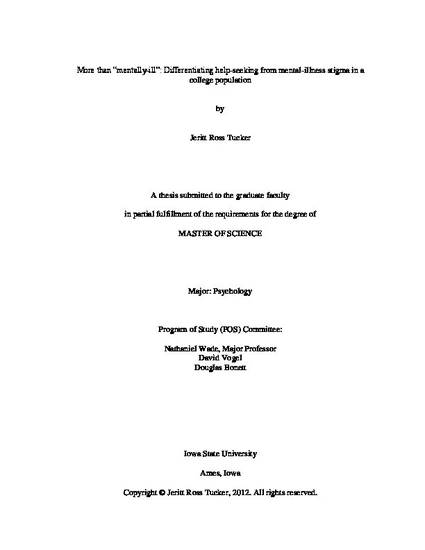
Two disparate and long-standing lines of research exist: studies of the stigma of mental illness (e.g., Link et al., 1989) and studies of the self-stigma of seeking psychological help (e.g., Vogel, Wade, & Haake, 2006). While some researchers implicitly treat these two constructs as synonymous (e.g., Corrigan, Watson, & Barr, 2006), others make the argument that they are theoretically and empirically distinct (e.g., Ben-Porath, 2002). To help clarify this debate, the present investigation examined measures of both constructs among 729 undergraduate students at a large Midwestern University. Exploratory factor analysis indicated that, while there is a strong correlation between the two types of stigma, they are conceptually distinct. Simultaneous multiple regression analysis indicated that help-seeking self-stigma explains 16% of the variance in attitudes toward seeking help whereas mental illness self-stigma explains roughly 2% of this variance. Additionally, for those with clinical levels of psychological distress who had not sought treatment, mean values of the self-stigma of mental illness were higher than mean values of the self-stigma of seeking psychological. Still, a test of dependent r's indicated that the self-stigma of seeking psychological help was more strongly correlated with attitudes toward seeking help for this population. Finally, logistic regression revealed that the self-stigma of seeking psychological help is negatively associated with the likelihood a person will have sought help. No such relationship was observed for the self-stigma of mental illness. Together, these findings provide strong evidence that the stigma of mental illness is conceptually distinct from the stigma of seeking psychological help, and that the stigma of seeking help may be more proximal to help-seeking attitudes and behaviors. Implications for researchers and clinicians interested in enhancing mental health service utilization are discussed.
Available at: http://works.bepress.com/jeritt_tucker/1/
